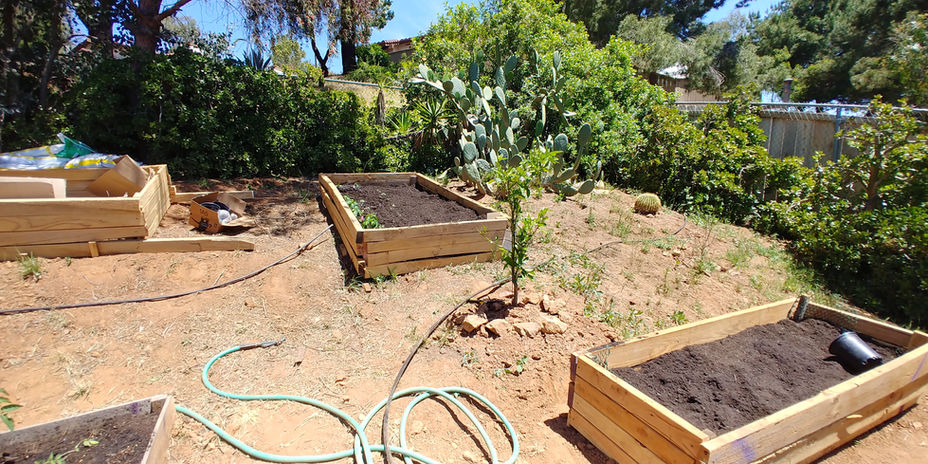
619-450-9876


Keisha's Garden of Hope
Localizing Food Source and Accessibility Through Neighborhood Placemaking for Resilience During COVID-19
By: Michelle Josey
During this 2020 pandemic, we are seeing what systems are inefficient and unreliable, and where more sustainable solutions can be applied. Now more than ever, the need to strengthen community ties within local neighborhoods is imperative to resilience. While our governing bodies are burdened with a collapsing system, so many people are suffering while they wait on getting basic needs. Some people haven't received their stimulus checks yet. The consequence of COVID-19 response has caused a myriad of changes from physical separation and panic to loss of income and mobility, and these unfortunate circumstances have negatively impacted the ability for many people to access nutrition and practice a sense of community. Our mental, physical, and spiritual health as individuals rely on our experience of community health. This is how the Table of Hope and Garden of Hope project came to be a solution to the very real need to build a sustainable community.
The Table of Hope emerged as a neighborhood community health response to the social and economic impact of COVID-19. On March 28, 2020 local San Diego resident and social impact architect Noura Bishay set up a folded table in her driveway and arranged the produce from one box donated by a local food distribution service called It's All About the Kids Foundation. The Lemon Grove food-giving table fed more than 15 families in three days. As people put food on the table, they also took food in exchange. The table was shared with Facebook community. Within hours, the table was filled, and it continues to be an active open food pantry managed by the neighborhood. Donations come from all over San Diego. The table now has two refrigerators, coolers, and another table has been added. Volunteers assist with keeping the table clean and resources flow in and out of the space, including donated refrigerators, packaged goods, children's toys, and products. It is designed to be a self-sufficient food distribution place that receives food from donors and also delivers food to those in need. The Lemon Grove Table of Hope is now collaborating with non-profits such as It's All About the Kids Foundation, Hugs and Bugs, Porchlight Community to receive leftover food to put on the table.
The Garden of Hope emerged as a support system for the Table of Hope, creating a resourceful channel connecting the table with a home garden designed to produce vegetables and food in abundance. Neighbors who live close to a food giving table can donate their backyard to be a home garden space with an agreement to give crop to the neighborhood food-giving table. Local resident and Table of Hope volunteer, Keisha, donated her back yard in a six-month agreement for the design of seven raised garden beds filled with a variety of compatible vegetable and herb plants, commonly consumed in the region, such as beans, tomatoes, cabbage, cucumber, dill, carrot, corn, onion, basil, pepper, zucchini, chard, eggplant. Local urban farmers and home gardeners have donated to the project site through seed exchanging processes and giving extra plants from nurtured seedlings. An Amazon wish list continues to be fulfilled, offering needed materials for the success of establishing garden beds, trellises, and materials to support the garden and table. Volunteers and donors have fueled the process. Keisha's garden is developed with drip irrigation connecting to each garden bed.
The Lemon Grove Table of Hope has successfully fed over 600 families in two months by creating channels of food to directly resource the table and remains an open community place for giving and receiving. As a result, there have been tables emerging in rural San Diego and outside the county with neighborhood participation and community support. There are now four tables serving Santee/Lakeside, National City/Chula Vista, and Pine Valley. Moreover, there are people interested in donating their land for the production of gardens to serve their communities and the tables. As the momentum of community support evolves, we continue to call in volunteers to put their hearts and hands into this project. As we move forward together in community, we want to acknowledge and invite the wisdom of the first stewards of the land, the Kumeyaay people, and the healthy ancestors we each bring with us in spirit, the spirit of community action, and the generosity of locals who reside in this space today during COVID-19. This is a true act of gardening community health, and we are all learning as well move forward together.
We have four tables:
Lemon Grove Table
1471 la Corta Circle, Lemon Grove, CA 91945
Santee and lakeside Table
9820 Maine Ave, Lakeside, CA
Pine Valley Table
8574 Valley View Trial, Pine Valley, CA
National City and Chula Vista
2263 Manzana Way, San Diego, CA
The best ways to support the development and growth of this project design:
-
Buy some materials on our Amazon Wish List: https://www.amazon.com/wedding/share/gardenofhope
-
Join our Facebook community and “Like” our page: https://www.facebook.com/groups/FOODGT/
-
Invite your friends and family
-
Donate food and essentials
-
Give us your leftovers
-
Sponsor a Table
-
Sponsor a Garden
-
Start your own Table of Hope
-
Donate your backyard to be a Garden of Hope
Some findings from this project so far and the reason why we are moving forward with it:
-
Women and single mothers are the largest percentage of the people we serve from the table
-
Milk, eggs, protein are greatly needed
-
Tables and gardens within close proximity to each other are the most self-sustainable
-
Home gardening is positively correlated to higher emotional well being among self-identified low income, women (Landscape and Urban Planning, Vol 198, June 2020)
-
Funding is necessary and this project is worth it!















































